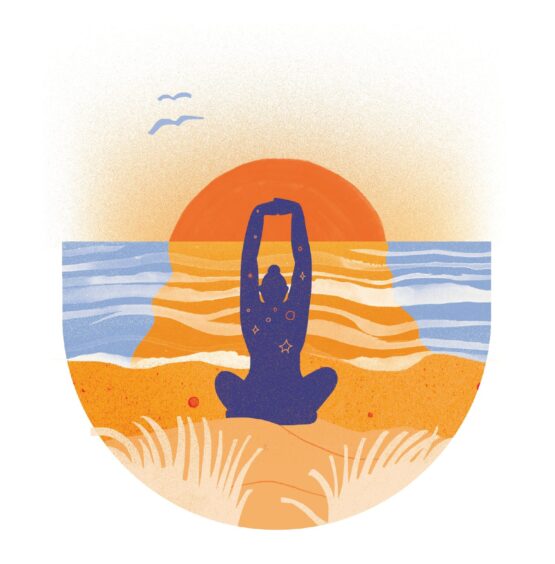
Whether playing a demonically possessed child on stage in The Exorcist, or a character battling PTSD in Warhorse in London’s West End, practicing meditation helped Clare Connolly leave her characters’ emotions and trauma at the stage door.
Bringing mediation to the masses with a regular slot on Jo Good’s BBC Radio show also helped get the yoga teacher, and her listeners, through the pandemic. Now Clare shares her passion for the ancient practice that helps her stay grounded and positive in her new book, Meditations for a Powerful You. Ideal for beginners, it explains how everyone can harness meditation to soothe our mind, body and soul.
“Mediation is a fundamental part of yoga but it isn’t just practiced by yogis and spiritual people, anyone can meditate and feel the benefits,” says Clare, 40, who lives in Surrey.
“It is a way to switch off the external world, connect with your feelings or emotions, and frame how you want your day to go.
“The radio show reminded people that anyone can meditate anywhere. Cab drivers called in to say they were pulling over for their daily meditation. People joined in around the world.”
Clare had been practicing yoga for 15 years before making one small but important change to her routine. “When I started meditating every day, everything started to fall into place, from my career to my love life,” she says.
“I was stuck in negative thought patterns but my daily meditation practice made me more aware and observant of how I returned to those negative thoughts. It helped me find better ways to approach things and make positive changes.
“I want to remind people they have power within them to change their lives.”
Her beautifully illustrated book explains meditation basics and includes 30 different practices that can help in different areas of life, such as letting go of anxiety, preparing for a blissful sleep or boosting energy. Each meditation has a QR code that links to Clare’s audio versions of them on her website.
“Often people don’t realise they need meditation until their lives become chaotic and they need something to help them be calm and more mindful,” says Clare.
“Meditating every day creates a cumulative response within the body and the brain. You begin to see things clearer, have better conversations, better relationships with people, and become more productive.
“Mediation can also help us harness our energy and inner-strength. I include practices that help people feel more mindful, balanced and present, others promote feelings of safety and security, and some will slowly build your energy and boost confidence.”
Clare has balanced teaching and practicing yoga and meditation alongside her career as an actor and voiceover artist. “Meditation helped me cope with difficult roles,” she says. “In The Exorcist and Warhorse, I played characters who were screaming and crying on stage every night and that’s not natural to go through.
“Meditation kept me grounded and stopped me from spiralling. I’d sit or lie down in my dressing room and breathe through all the crazy feelings until I reconnected with myself and felt happy and calm.”
Clare believes regular meditation can also benefit our health as it can reduce anxiety and stress and promote better sleep.
“It reconnects you with yourself, helps to relax your body, muscles and mind and also helps to calm the nervous system. When you relax your adrenal glands, it stops the body producing cortisol, the stress hormone, and this can reduce inflammation and help boost your immune system.”
For anyone worried that they could never quieten their minds enough to meditate, Clare says there’s a good reason that the Tibetan word for meditation means “to become familiar”.
“Meditation is not about making your mind a completely blank state, which might come later on,” Clare explains. “It’s about becoming familiar with your mind and observing your own thoughts and thought patterns. When we become familiar with these thoughts, we can start to reframe or to change them.
“If constant negative thoughts lead you to express more negative emotions and complain then during your meditation you can catch yourself and decide ‘I don’t want to feel like that today. I want to feel satisfied and happy’. It’s about being more mindful of negative emotions and realising you can choose to let them go.”
Clare recommends starting with quick meditations that you can gradually build up and says setting an alarm five minutes earlier to include a quick meditation is a great way to set the tone for your day.
“You’ll feel more energised and clear-minded about your day. If you take the time to meditate every day, and feel a bit better afterwards, imagine what that can do over time to make you feel more at peace.”
Meditations For A Powerful You is published by CICO Books, £14.99.

Enjoy the convenience of having The Sunday Post delivered as a digital ePaper straight to your smartphone, tablet or computer.
Subscribe for only £5.49 a month and enjoy all the benefits of the printed paper as a digital replica.
Subscribe © SYSTEM
© SYSTEM © SYSTEM
© SYSTEM © SYSTEM
© SYSTEM